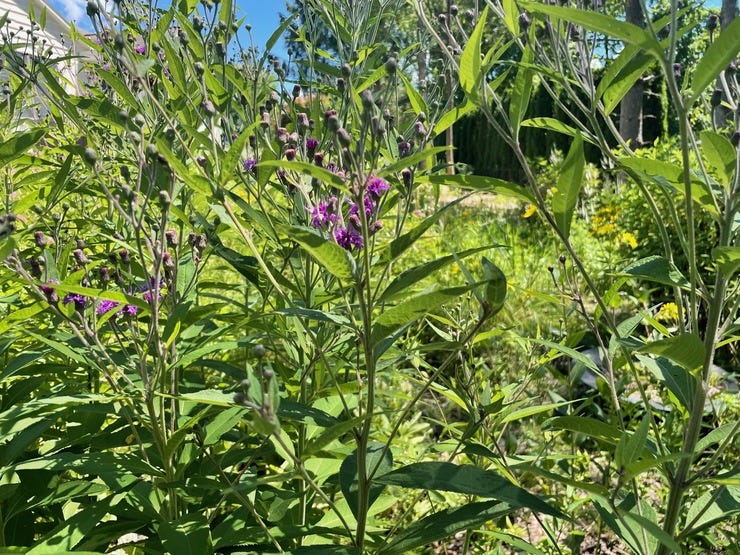Refugia Newsletter #20 by Debra Rienstra: climate legislation breakthrough?!, EV battery technology, native wildflowers, and climate art
Refugia News
Pretty soon, I'll get around to serious work on my fall syllabi, but for now, I've had a couple busy weeks doing refugia-related things. I've recorded episodes for the Refugia Podcast with Rev. Dr. Jim Antal, UCC pastor and longtime leader in the climate movement, and with May Boeve, one of the founders of 350.org. Those episodes will be released this fall.
I also spent a lovely day "up north" in Michigan at Au Sable Institute, where a cohort of Christian college students spend part of their summer studying environmental science in a woodsy Michigan setting. We talked theology, working through a biblical and theological basis for a Christian response to the climate crisis.
Finally, Calvin University tried out a "January Series in July" online event, and I was lucky enough to be part of it. My colleague and friend Karen Saupe interviewed me in Calvin's Bunker Interpretive Center at our nature preserve--one of the campus's treasures. Karen remarked appreciatively about Refugia Faith that she didn't feel nagged by it. I assured her, I am fully capable of nagging (as my children will attest)!
This Week in Climate News
Well! What happened?? Two weeks ago, I railed against Sen. Joe Manchin in this newsletter for blocking historic climate legislation. And now--he's changed his mind?! Late this week, word came down that Sen. Chuck Schumer and Manchin had reached an agreement, and suddenly, so much seems possible again.
The "Inflation Reduction Act of 2022" is a new version of Build Back Better--except with a very different name, obviously, one that seems meant to give Manchin cover for rejecting the last bill due to his ostensible worries about inflation. The new bill is a compromise, but $369 billion worth of crucial climate-related programs remain. Climate movement people are cautiously thrilled.
The bill includes:
prescription drug cost reductions
extension of health care subsidies
tax reform that enforces fair taxes on huge corporations and closes loopholes for the very wealthy
consumer-facing incentives like rebates on electric vehicles, solar panels, heat pumps, and more
tax incentives to promote clean energy industry
money to address environmental injustices
penalties for methane emissions
and of course, a few juicy morsels for the fossil fuel industry
The Washington Post has a more detailed and technical summary here.
Is it a big deal? YES! Schumer remarked that “By a wide margin, this legislation will be the greatest pro-climate legislation that has ever been passed by Congress.” And climate experts are agreeing (also noting that the bar is rather low). If this bill passes and gets signed, the US will be back in the game to make good on its pledges to reduce emissions.
Dr. Leah Stokes (see video below), a climate policy specialist who has been involved in White House climate policy, notes that the initiatives in this bill should get us to 40% reductions in emissions compared to 2005 by 2030, about 80% of the way toward Pres. Biden's pledge. She also notes that the incentives for consumers could save each of us $1800 a year in energy costs. If you're ready to start thinking about solar panels, heat pumps, an EV: go back to my last newsletter for a great resource to help you plan!
What happened that caused this whiplash shift in Manchin's position? Well, one possibility, as Dr. Stokes suggests, is the blowback after Manchin's infuriating "never mind" two weeks ago. He may have realized, as Stokes put it, that "he didn't want to have his legacy be one of climate destruction."
Another possibility is a remarkable push from young White House staffers to urge Schumer back into negotiations. The push involved a letter and a sit-in in Schumer's office, resulting in some arrests. This article by Andrew Marantz in The New Yorker explains just how unusual it was for staffers to engage in this kind of activism inside the halls of power.
Ultimately, Manchin may have just figured out that the climate policies in this bill just make economic sense and that the energy transition is happening anyway. The bill will help turbo charge developing clean-energy industries, create millions of jobs, and enhance energy security--causes that tend to please more conservative ears. As one policy expert put it: "Ultimately, the way forward is to reorient climate towards jobs and security." (I think he means "climate rhetoric.")
As for those juicy morsels for the fossil fuel industry, it's possible they may not amount to much in the end. They involve a requirement for federal lease sales, but the provisions of the bill are meant to reduce demand for fossil fuels by shifting the economy toward clean energy. If that happens, it won't make financial sense for fossil fuel companies to invest in new development. Let's hope that's the case.
Will it pass? Everyone's holding their breath. We've had our hopes raised and dashed before. Apparently, Sen. Kyrsten Sinnema is balking a little. If you live in Arizona, would you mind calling up Sen. Sinnema's office and urging her to get on board?
Meanwhile, here's a 15-minute video interview with Dr. Leah Stokes, giving a summary of the bill's provisions, and with Saul Levin, one of the ringleaders of the staffer rebellion.
Deeper Dive
Thanks to high gas prices and advancing technology, more US car-buyers are eyeing electric vehicles with longing. A recent AAA survey found that 25% of American car-buyers want an EV for their next vehicle.
I guess Ron and I are ahead of the trend here, as we're about to pick up our second EV next week. We're leasing, not buying, partly to avoid a huge cash outlay and partly so that we can upgrade later as EV technology advances.
If the Inflation Reduction Act passes, the rush to shift to EVs will accelerate. That means a race to build out charging infrastructure and improve batteries, too. EV batteries have come a loooooong way, but they still take varyingly long times to charge, have limited range, and depend on problematic, mined minerals like lithium and cobalt. And how to recycle these things?
This longer article by Jack Ewing in the New York Times surveys the latest battery technology challenges and has numerous links to other in-depth reporting on the EV industry.
Refugia Sighting
Well, that's about enough politics for one newsletter. Let's look at flowers instead. I mentioned cleaning up our backyard "refugium" last time. This is the small area that we are working with our neighbors to "rewild." I describe it quite a bit in Refugia Faith, and every now and then I provide an update here.
We started this project three years ago, and before we even realized it, we were part of a national movement to create "Homegrown National Park," an initiative launched by University of Delaware entomologist Douglas Tallamy. The idea is for private landowners to build wildlife habitat one square meter at a time: small is OK! It all adds up.
Late July starts "peak bloom" for our native wildflowers, and the pollinators are starting to go mad with glee. Here are some photos to enjoy. These natives started three years ago as little ankle-high babies, and now many of them are 4-6 feet tall!
The Wayback Machine
We've had politics and wildflowers: how about some art? In July 2021, I wrote this piece on climate-related art works. So interesting, what artists are up to! There's music, sculpture, murals, even urban design. Artists help us notice, lament, rejoice, imagine--and extend the horizon of possibility.
Thank you!
Thanks for reading! I keep these newsletters quickly scannable, with opportunities for deeper reading as you are able. I also tend to emphasize the connections between faith communities and climate action.
You can send me a response to this newsletter simply by replying to the email that brought it to you. If you are so inclined, please follow me on Twitter or Facebook @debrakrienstra. You can always contact me on those platforms, too. Also check out my website at debrarienstra.com.
If you like this newsletter, please share with others!









